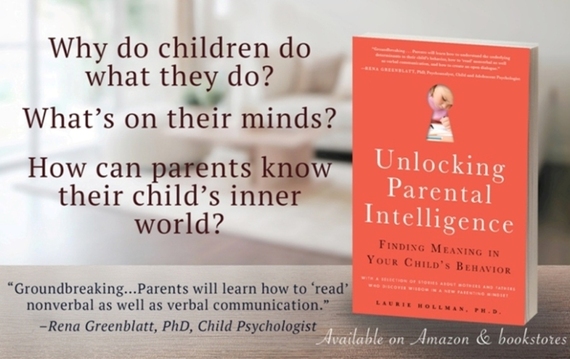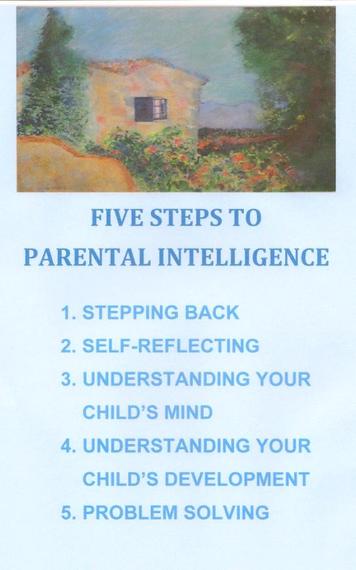All mothers have those days or weeks when whatever they say doesn't seem to work to ease their children's large and small problems as they arise. They feel disillusioned and full of self-doubt as a parent. They wish they had Parental Intelligence, some wisdom encrypted on their brains that would lead them through the maze of parenting. This happens to most parents some more or less at different stages of their child's development.
So, let me share how to unlock your Parental Intelligence and start believing in yourself again.
When you face a puzzling behavior of your child or teen there are five steps to take to improve your communication and strengthen you parent-child/teen relationship. Using these steps will not only solve the disconcerting behavior, but lead you to the problems underlying the problem.
Your child or teen comes home from school and ignores you. He or she goes to their room and slams the door. This is unlike him. He's a friendly sort who usually tells you naturally about his day and even asks about yours. You don't like the behavior but have the feeling that rushing in and yelling at him or suggesting a punishment is only going to make matters worse. You're right!
Instead step back and think over what's been going on as far as you know that day. Think of the last few days. Has anything been worrying him? Are there fights with other kids, big tests coming, arguments with you that have been unexpected? Take all this in and see if you come up with what might be promoting this ignoring and aggressive behavior.
Step 2: Self-Reflecting
Think about how you felt when you were ignored and then heard the door slam. Did it make you worried, concerned, angry, irritable? Counsel yourself on these feelings before taking action. Maybe they are clues to something that's going wrong.
Step 3: Understanding Your Child's Mind
This is the crux of the matter. You need to understand what is troubling your child. Rather than think of him as being a "bad child" that day. Think of him as a distressed child in need of your help. Gently knock on his door and ask if you can come in. Suggest in a casual way that you think something is troubling him and want to help.
You may be surprised by what you hear. For example, his girlfriend broke up with him and he's downcast and forlorn. He's distressed deeply and at a loss of what to do. Before you know it slamming the door starts to make sense and you are talking together about the underlying problem.
Step 4: Understanding Your Child's Development
Thinking of his stage of development, let's say a freshman in high school just for an example. This was his first real girlfriend and he's never been through something like this. They seemed committed to each other. He doesn't know how to handle such an action by this girl and you need to help him through this beginning stage of romantic relationships.
Step 5: Problem Solving
Now that you know so much about the problem involved, ignoring you and slamming a door don't matter anymore. You need to help him feel his sorrow and perhaps try to rectify the situation with this girl. If she is definite, then he needs your support. He will have trouble concentrating on his school work for a while and will need your assistance. He'll need much more time to talk and be encouraged to go out with other friends. This is a problem that will take time as you help him regain his confidence and boost his ego.
An overall benefit to this process has not only been solving the underlying problem, but you are strengthening your parent-teen relationship. Your child now can trust you with unexpected blows to his self-esteem. Using Parental Intelligence has been amazing. You have stepped back and taken your time to understand what the overarching concerns are about and led your child to a place where he can solve his distress with your help.

Laurie Hollman, Ph.D., is a psychoanalyst and author of Unlocking Parental Intelligence: Finding Meaning in Your Child's Behavior found on Amazon, Barnes and Noble, Familius and wherever books are sold.
